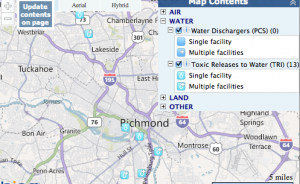If you are wondering how Richmond compares to other parts of the country in terms of water and energy usage, head to the “My Environment” tool on the EPA website. It allows users to search for cities nationwide, displays a map with local sources of air, water, and land pollution. As geography students, this tool allows us to apply concepts we are learning about water, the atmosphere, and environmental processes to local spaces. The icon for each source reveals the name and address of each potential source of pollutants:
The site also compares local energy production to local energy consumption in terms of coal,natural gas, petroleum, and other sources of energy. Both Virginia and my home state of North Carolina consume more petroleum than any other energy source. While according to the data NC only produces nuclear energy, VA produces coal, natural gas, nuclear, and renewable energy. Data contained on the page is time sensitive, and users can even find out the daily air quality at their location. On the day of this post, my hometown was experiencing the most air pollution from particulate matter, while Richmond’s air was most polluted by carbon monoxide.
The site also encourages community interaction, and contains a “My Community” link where users can report on positive changes being make for the environment. Though the Richmond page does not currently have any news showing, we already know from our geography class that the city of Richmond and the University of Richmond are sensitive to protecting our natural resources.



I think that this is a great tool. It is scary how much pollution there is near and around us that goes unnoticed by so many people. This website makes it easy for people to find out what is going on in their area, and to see if there are any positive changes being made for the environment. I think a big hurdle is getting people aware of the environmental problems in their area, so tools like this can be very useful.
This is an awesome website. I looked up my zip code at home and learned so much about what was happening back home, ranging from water quality to learning when a recycling event occurs such as a trash pick-up (particularly helpful while living at the beach).
As difficult as it can be to learn about some governmental departments, this website makes the EPA’s information not only very accessible, but also very easy to use. I would use this website if I wanted to get more in-depth information about the area to decide where I want to live in the future.